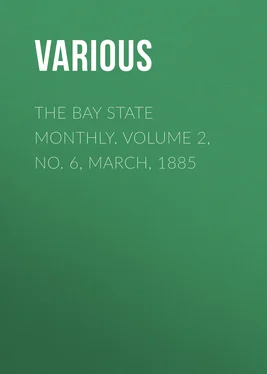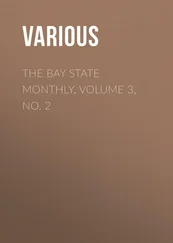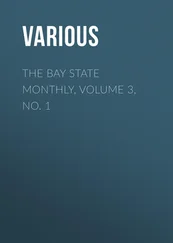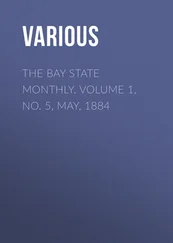Various - The Bay State Monthly. Volume 2, No. 6, March, 1885
Здесь есть возможность читать онлайн «Various - The Bay State Monthly. Volume 2, No. 6, March, 1885» — ознакомительный отрывок электронной книги совершенно бесплатно, а после прочтения отрывка купить полную версию. В некоторых случаях можно слушать аудио, скачать через торрент в формате fb2 и присутствует краткое содержание. Жанр: foreign_antique, periodic, foreign_edu, на английском языке. Описание произведения, (предисловие) а так же отзывы посетителей доступны на портале библиотеки ЛибКат.
- Название:The Bay State Monthly. Volume 2, No. 6, March, 1885
- Автор:
- Жанр:
- Год:неизвестен
- ISBN:нет данных
- Рейтинг книги:3 / 5. Голосов: 1
-
Избранное:Добавить в избранное
- Отзывы:
-
Ваша оценка:
- 60
- 1
- 2
- 3
- 4
- 5
The Bay State Monthly. Volume 2, No. 6, March, 1885: краткое содержание, описание и аннотация
Предлагаем к чтению аннотацию, описание, краткое содержание или предисловие (зависит от того, что написал сам автор книги «The Bay State Monthly. Volume 2, No. 6, March, 1885»). Если вы не нашли необходимую информацию о книге — напишите в комментариях, мы постараемся отыскать её.
The Bay State Monthly. Volume 2, No. 6, March, 1885 — читать онлайн ознакомительный отрывок
Ниже представлен текст книги, разбитый по страницам. Система сохранения места последней прочитанной страницы, позволяет с удобством читать онлайн бесплатно книгу «The Bay State Monthly. Volume 2, No. 6, March, 1885», без необходимости каждый раз заново искать на чём Вы остановились. Поставьте закладку, и сможете в любой момент перейти на страницу, на которой закончили чтение.
Интервал:
Закладка:
A recent circumstance, however, has made it essential to my good name, which I cannot bring myself to believe you wish to see destroyed, to go back to my former purpose; in pursuance of which, the object of this letter is simply to introduce certain statements of gentlemen lately in the army, your friends as much as mine, in hopes that the explanations to be found therein will be sufficent to authorize you to give me a note of acquittal from blame, plainly enough, to allay the suspicions and charges to which I have been so painfully subjected. The statements are in the form of extracts pertinent to the subject from letters now in my possession, from General Fred Knefler, General George McGinnis, Colonel James R. Ross, General Daniel MacCaulay, Captain Ad Ware, General John A. Strickland, General John M. Thayer, now United States Senator from Nebraska—all, of my command, on the day in question, present with me, well known to you, and of unimpeachable honor. I could have obtained many others, of like import, but selected these because their authors had peculiar opportunities for information upon points considered of chief importance. It is possible that my explanations of the matter would be sufficient for the purpose in view. However that may be, it is my judgment now, that the charges against me have gone so far, and been put in such grave form, that public opinion may require an exoneration, though it come from your hand, to be based upon the testimony of others.
Permit me to say, further, that as to the order you started to me by Captain Baxter, I do not understand there is any question of veracity between us. You tell me, that from the battle-field you dispatched a verbal order by the officer named, to be delivered to me, at Crump's Landing, directing me to march my division to Pittsburg Landing by the road, parallel with the river; and, supposing, as you did, that the order would reach me by 11 o'clock, A.M., you reasonably concluded my command would be on the field by 1 o'clock, P.M.
Now in all candor, if you have been, as I am informed, of opinion that I received that order as it was given, and at the time stated (11 o'clock, A.M.), and that for any reason, such as personal feeling against you, or that I lost my way, or took the wrong road, or lingered on the march, making but five miles in seven hours, it must be admitted that you were justifiable in any, even the most extreme judgment against me; and I must confess that your moderation was greater than mine would likely have been, had our positions been reversed. I do not flinch from that conclusion, at all; but what I do say in my defence is that the opinion and the conclusion, which is its corollary, are both wrong, because the order admitted to have been dispatched was not delivered to me, in form or substance, as dispatched. On the contrary, the order I received from your messenger was in writing, unsigned, and contained substantially the following instructions:
"You will leave a force at Crump's Landing, sufficient to guard the public property there; then march the rest of your division, and effect a junction with the right of the army ; after which you will form your line of battle at right angles with the river, and act as circumstances dictate."
This order was read by Colonel Ross, under circumstances well calculated to impress it upon his memory. It was also given to Colonel Knefler, then my Adjutant General, and by him read and unfortunately lost. Finally, its purport, as stated by me above, is vouched for by Captain Ware as the aide de camp. To refuse credit to my version of its contents will be very hard, indeed, corroborated as it is by so many gentlemen of unquestionable veracity, and such excellent opportunity for information on the point.
I think myself warranted now in asserting upon the credit of the three officers just named, as well as my own, that by the terms of the order, as it was delivered to me, the object of my march was not Pittsburg Landing, as you intended, but the right of the army, resting, when the battle opened in the morning, at a point quite three miles out from the landing, on the road to Purdy.
As a general principle it must be admitted that when you entrusted the order to a proper messenger for delivery to me, your responsibility ceased; but, I turn and ask you, appealing to your experience and justice, how am I held responsible for the execution of an order if it never reached me; or, if it reached me, conveying an idea radically different from that originally given? Of necessity, I was accountable for the execution of the order, only as it was received, and if it was not received in a form to convey your true design, but was promptly executed, neither of us are responsible for the result. It was not your mistake, nor was it mine.
Having established the purport, at least, of the order as it came to my hand, the next inquiry is: "Did I proceed to execute it, and how?"
On these heads all the letters on file are applicable. They show, as I think, that I took measures anticipatory to the order you gave me, personally, in your passage up the river to the battle-field, viz: to hold myself in readiness to march in any direction; that my brigades were ordered to concentrate at the place most proper and convenient for a prompt execution of the orders, whatever they might be, because it was at the junction of two roads, one leading to Pittsburg Landing, the other to the right of the army. To one of these points, it may be added, I was sure of being ultimately sent, if the exigencies of the battle required the presence of my command. They show, that after you parted from me, going up the river, I took measures to forward your messenger to me instantly upon his arrival (see Colonel Ross' letters), then rode to the place of concentration, and waited impatiently and anxiously the expected instructions; that they came to hand about 12 o'clock (my own remembrance is 11:30 A.M.), and that the officer who brought them, also brought the news that you were driving the enemy all along the line. (See letters of General Knefler and Colonel Ross.) Up to that time, therefore, I was certainly blameless.
But let me ask you to stop here, and consider the effect on my mind and subsequent movements, of the information, thus reliably obtained, that the battle was won. What inducement could I have had to march away from or linger on the road to a victory? Upon the hypothesis that the good news was true, how could I have imagined, (had there been so much as a doubt as to the intent of the order received,) a necessity for my command at Pittsburg Landing?
But, proceeding. The letters further establish, that, immediately upon receiving the order, I put my column en route , to execute it.
Now comes the questions. Did I take the right road to effect the junction with the right of the army, or one leading to Purdy, away from the battle? Pertinent to these inquiries, General Knefler says, that the road chosen for the movement had been patrolled and picketted by my cavalry. By their report, if by nothing else, I must have been posted as to its terminus. In corroboration of this assertion please notice that General Macaulay, General Strickland, General Thayer and General Knefler, all allude to the fact that the head of the column was approaching, not going away from the firing, when the countermarch took place. Consider, further, that the most imperative necessities of my situation, isolated as I had been from the main army, were, to know all the communications with that army, and to keep them clear, and in order for rapid movement. Not only did I know the road, but every step my division took from the initial point of the march up to the moment of the change of direction, was, as is well known to every soldier in the column, a step nearer to the firing and therefore a step nearer to the battle . While on this inquiry, let me add that the report of my being set right after marching upon the wrong road has in it this much truth, and no more. When about a mile from the position which had been occupied by the right of the army (General Sherman's division), Captain Rowley overtook me and told me that you had sent him to hurry me up, and that our lines had been carried by the enemy and the army driven back almost to the river, a very different story from the one brought me by Captain Baxter. Captain Rowley set me right as to the conditions of the battle, not as to the road I was following. Colonel McPherson and Major Rawlins, the other members of your staff, mentioned as having been sent to me, met me after the countermarch, when my command was on the river road moving to Pittsburg Landing.
Читать дальшеИнтервал:
Закладка:
Похожие книги на «The Bay State Monthly. Volume 2, No. 6, March, 1885»
Представляем Вашему вниманию похожие книги на «The Bay State Monthly. Volume 2, No. 6, March, 1885» списком для выбора. Мы отобрали схожую по названию и смыслу литературу в надежде предоставить читателям больше вариантов отыскать новые, интересные, ещё непрочитанные произведения.
Обсуждение, отзывы о книге «The Bay State Monthly. Volume 2, No. 6, March, 1885» и просто собственные мнения читателей. Оставьте ваши комментарии, напишите, что Вы думаете о произведении, его смысле или главных героях. Укажите что конкретно понравилось, а что нет, и почему Вы так считаете.












